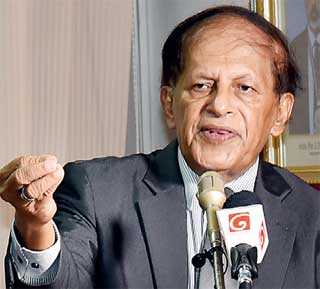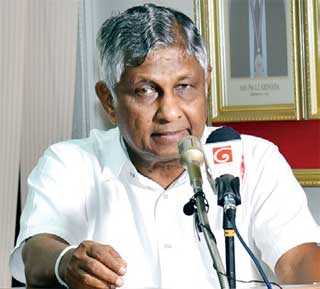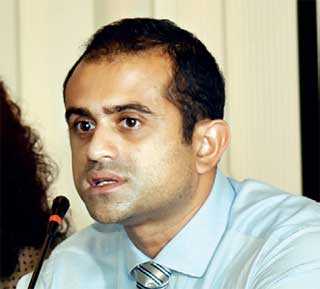Wednesday Feb 18, 2026
Wednesday Feb 18, 2026
Thursday, 1 August 2019 00:00 - - {{hitsCtrl.values.hits}}
By Maleesha Sulthanagoda
Small and Medium Enterprise (SME) experts speaking at a seminar earlier this month shed light on the struggles of the Sri Lankan SME sector to develop and thrive.
Former Ambassador of Sri Lanka to UAE and Israel Sarath Wijesinghe expressing his views on the country’s SME sector and the future outlook for the industry said that the Government hadn’t realised the importance of the sector to the nation’s overall growth.
 |
Former Ambassador to UAE and Israel Sarath Wijesinghe |
 |
DSI Samson Group, Chairman and Dr. Damayanthi Perera Group MD Kulatunga Rajapaksa |
 |
High Life MD/CEO Vidura Jay |
 |
Dashitha Bogollagama |
 |
Dr. Damayanthi Perera |
“In recent times, developing countries such as ours haven’t realised the importance of SMEs to a country’s overall growth, not even the private sector. In Sri Lanka, the concept of a SME is still in its preliminary stages. Stakeholders should do more in order to uplift the state of SMEs in the country. We should invest more in SMEs and the Government should also promote SMEs more,” he added.
Wijesinghe also noted that the Sri Lanka Government should make Israel the role model when carrying tasks concerning SMEs.
“We should use Israel as a role model to develop our SME sector. Although small, Israel is much more advanced than Sri Lanka. This is mostly due to its booming SME, and export sector. Israel is one of the main exporters of technology to the EU, USA, China, India, Russia, Turkey, Japan and many other countries. Almost 50% of the Israeli GDP is from exports. These export sectors set, from a strong and time-tested SME sector. The SME sector is truly the backbone of the Israeli economy,” the former Ambassador concluded.
DSI Samson Group Managing Director Kulatunga Rajapaksa also speaking at the event highlighted some major issues concerning the SME sector of the country by relating them to the origins of the DSI Group, and ways of remedying these issues.
“When we compare the current state of the SME sector to that of a few decades ago, there are many major differences. During the inception of the DSI Group, Sri Lanka had an open economy, thereby making it easier for us SMEs to sell our products. Even though we had a lot of hurdles when going on the journey, we had no difficulty marketing our products. Nowadays, the situation has completely changed. Manufacturing is challenging, and marketing is even more difficult.”
He noted that this was in part due to the lack of a dedicated Ministry of Industry.
“Manufacturing, and marketing tasks are problematic due to a lack of guidance. For a bizarre reason, Sri Lanka doesn’t have a Ministry of Industry. However, we do have a Ministry of Industry and Commerce. In my knowledge, there are no other countries where these two sectors have been amalgamated with each other. To properly function, dedicated Ministries for both sectors should be established. In all previous governments, we had two separate ministers for each of these sectors. After the current Government combined them, the industry sector has been totally neglected.”
The Group Managing Director, proceeding to list systematic issues plaguing the country’s SME sector conveyed that the Government should assist in developing the sector, without focusing more on Free Trade Agreements (FTAs).
“To develop the SME sector, there should be Government recognition and assistance. Various institutions are required for this. The Government lacks these institutions that ease the setting up of SMEs. There are some firms set up for this task, but they are white elephants to the whole industry. For example, the Industrial Development Board, was set up with the intention of assisting SMEs. I haven’t seen any development taking place in the Development Board. As of now, there is no assistance to the manufacturing processes at all, whereas priority is given to FTAs, as a result of which will be an influx of foreign products into the domestic market. Currently, Sri Lanka has become a dumping ground for most foreign products. In conjunction with talks of new FTAs increasing, the number of SMEs, and the sheer productivity of a firm will decline. The trend nowadays is to import everything. This will lead to an increasingly low number of pre-existing SMEs to be developed,” he added.
He also noted that most SMEs were extremely tight for liquidity due to the fact that there is a lack of development banks in the country. Although DFCC and NDB banks were available, these later became commercial banks, lending at higher interest rates. The DSI Group Manager stressed that the availability of development banks dedicated to catering towards the SME sector was a must.
Rajapaksa also revealed that there was an alarming lack of labour in the SME sector, together with an excessive amount of Government employees, which is affecting the efficiency of the firms.
“Another issue in the SME sector is the quality of labour. Most people who join the sector, don’t have the required education to properly run a business. Majority of high school and university graduates select different professions and very few join the SME sector. As of now, we have a Government servant for every 15 citizens, whereas most other countries have a single government servant for at least every 200 citizens. The SME sector has a serious problem with the lack of human capital. The DSI Group employs more than 10,000 workers to complete our tasks and we still have over 4,000 vacancies. This is because most people prefer for comfortable jobs in the Government, or other simpler and more independent jobs.”
He also said that the expenditure on research, and development (R&D) was too low for any significant development to take place in the sector and the country.
“The expenditure on R&D in Sri Lanka is severely low when compared with other countries. In the past there was a system introduced to allow a tax reduction on R&D activities. In the current budget, this has been withdrawn.”
Continuing the theme of using Israel as a role model, Rajapaksa spoke on the Israeli economic boom through extensive R&D, leading to a massive export market.
“In Israel, they export mainly technology, and not many products. When we compare ourselves to this, we are eons behind. Very rarely do we export any kind of technology. First we need to develop innovative technologies before we even think about exporting it. With R&D expenditure being at a minimum level, we will not be doing this anytime soon. Universities should interact with the private sector to engage in R&D. Most pre-existing export industries of the country only revolve around assembly, and re-exportation. We import components, assemble in our factories, and then re-export it. Most of these products aren’t manufactured in the country. We are essentially spending money to export.”
He added that this was an adaptation of the Japanese structure of operations, where they bring in different parts from smaller companies through sub-contracts, and assemble them in their own factories, for re-exportation. Rajapaksa went on to mention that the DSI Group also follows the same structure for some products, such as bicycles.
The Group Director also mentioned that Sri Lanka needed a clear set of policies to help in properly developing a SME sector.
“The country needs to have a consistent policy for SMEs. The main objective should be to develop the country while keeping the country’s native industries safe from increasing number of imported products. These should be protective measures taken by the Government to safeguard the country’s domestic products, and industries. It’s important that smaller companies are given the proper support to function smoothly. Nowadays, this is not the case as the laws have been adjusted in such a way to discourage the SME sector,” he added.
Rajapaksa concluded noting that the Israeli model of handling SMEs is ideal to Sri Lanka, because it focuses heavily on innovation, technology, and development.
“What the SME sector of the country needs are a clear cut set of policies, assistance from development banks, Government recognition, room to develop, and an easier taxation structure. All of these are prevalent in Israel. Hence the Israeli model is very attractive to our country as a role model when handling the SME sector,” he concluded.
Pix by Ruwan Walpola